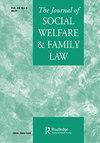欢迎打破?根据《2014年护理法案》,假期和娱乐是符合条件的需求
IF 0.9
Q2 LAW
引用次数: 0
摘要
在R (BG和KG)诉萨福克郡议会一案中,上诉法院维持了高等法院的判决,即《2014年护理法案》(CA 2014)授权地方当局为有资格需要照顾和支持的人支付假期和其他娱乐活动的费用。在这样做的过程中,该判决比以往任何案件都更能推动《2014年公民权利法》中的自决和能动性,并为其条款注入一种人格意识。该个案涉及成年兄弟BG和KG,他们患有自闭症、学习障碍、焦虑和包括癫痫在内的身体状况。BG和KG需要由其母亲SQ在其他家庭成员的协助下无偿提供24小时护理。由于之前在日托中心受到虐待,这对兄弟无法信任其他护理人员。从2011年开始,萨福克郡议会(SCC)每周向BG和KG提供108-150英镑的直接支付。SCC批准使用这些资金来资助家庭郊游,活动和休息,因为它评估了兄弟俩有娱乐和假期的合格需求。从2014年开始,SCC还每年为兄弟俩提供3000英镑的“临时预算”,用于旅行和度假,包括2015年、2017年和2018年在佛罗里达的家庭度假。一位社区护士称,这些休息时间具有治疗价值,可以让所有家庭成员减轻痛苦,并使SQ继续发挥她的照顾作用。2020年,SCC通知该家庭,它将终止直接支付和临时预算。在直接资助方面,工商事务局表示,由于兄弟二人的所有资助需要均由其家人提供,因此没有合资格的未获满足的需要,而工商事务局可合法地提供。由于同样的原因,临时预算不再支付,并且根据2014年CA,假期费用不是合格的需求。关于所有付款,SCC表示,由于2014年CA的资格标准要求需要引起“身体或精神损伤”(2014年护理和支持(资格标准)规例,r 2(1)(a)),因此它无权资助任何从事该活动的人所产生的与休闲活动有关的“普遍”费用。例如,它表示,它不负责支付度假旅行或住宿或景点门票等费用,而只负责支付费用本文章由计算机程序翻译,如有差异,请以英文原文为准。
Welcome break? Holidays and recreation as eligible needs under the Care Act 2014
In R (BG and KG) v Suffolk County Council the Court of Appeal has upheld the High Court decision that the Care Act 2014 (CA 2014) empowers a local authority to pay for holidays and other recreational activities for people who are in need of care and support, where there is an eligible need. In doing so, the judgment does more than any previous case to advance self-determination and agency in the CA 2014 and infuse its provisions with a sense of personhood. The case concerned adult brothers, BG and KG, who have autism, learning disabilities, anxiety and physical conditions including epilepsy. BG and KG require 24-hour care which is provided on an unpaid basis by their mother, SQ, with assistance from other family members. The brothers are unable to trust other carers as a result of abuse they previously experienced when attending a day centre. From 2011, Suffolk County Council (‘SCC’) provided direct payments of between £108-150 per week to both BG and KG. SCC approved the use of these to fund family outings, activities and breaks as it had assessed the brothers as having eligible needs for recreation and holidays. From 2014, SCC also provided an annual ‘respite budget’ of £3000 to each brother which they used to finance trips and holidays including family holidays in Florida in 2015, 2017 and 2018. A community nurse described these breaks as having a therapeutic value, allowing all the family to feel less distress, as well as enabling SQ to continue her caring role. In 2020, SCC advised the family that it would be ending both the direct payments and the respite budgets. In respect of the direct payments, SCC stated that as all the brothers’ support needs were being fulfilled by their family, there were no eligible unmet needs that it could lawfully meet. The respite budget was no longer to be paid for the same reason, and on the basis that holiday costs were not an eligible need under the CA 2014. In relation to all the payments, SCC stated that as the eligibility criteria under the CA 2014 require needs to arise from ‘a physical or mental impairment’ (Care and Support (Eligibility Criteria) Regulations 2014, r 2(1)(a)), it was not empowered to fund the ‘universal’ costs connected to leisure activities that would be incurred by anyone undertaking that activity. It stated, for example, that it was not responsible for paying costs such as holiday travel or accommodation, or an entrance ticket to an attraction, but only costs
求助全文
通过发布文献求助,成功后即可免费获取论文全文。
去求助
来源期刊
CiteScore
2.00
自引率
13.30%
发文量
52
期刊介绍:
The Journal of Social Welfare & Family Law is concerned with social and family law and policy in a UK, European and international context. The policy of the Editors and of the Editorial Board is to provide an interdisciplinary forum to which academics and professionals working in the social welfare and related fields may turn for guidance, comment and informed debate. Features: •Articles •Cases •European Section •Current Development •Ombudsman"s Section •Book Reviews

 求助内容:
求助内容: 应助结果提醒方式:
应助结果提醒方式:


